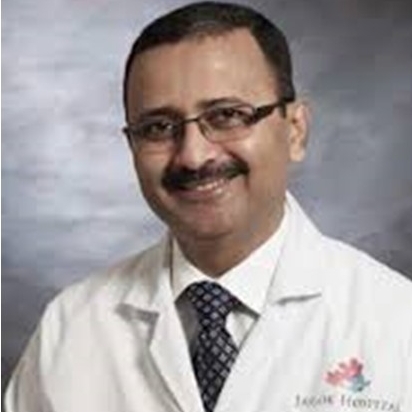 100%
100%
DR JOY DESAI
Neurologist
-
Tuesday 2:00 PM - 4:00 PM
(See all timing)Tuesday 2:00 PM - 4:00 PM,
Friday 2:00 PM - 4:00 PM
Introduction
Dr. Joy Desai is one of the best Neurologists and DNB teacher for Neurology at the Jaslok Hospital and Research Centre. Dr Joy Desai completed his MBBS and MD in Internal Medicine from the BJ Medical College, Ahmedabad, Gujarat. During this period Dr Joy Desai was the recipient of three gold medals. Dr. Joy Desai then moved to Mumbai and completed his DNB in Neurology at the Jaslok Hospital and Research Centre. During this period he was trained by Professors Noshir Wadia, Piroja Wadia, Sarosh Katrak, and Anil Desai. Dr. Joy Desai attributes his neurological skills to their tutelage. During this tenure Dr. Joy Desai participated in departmental clinical research. Dr Joy Desai then moved to The Royal London Hospital, London, UK for a period of three years for a fellowship in clinical neurology. He participated in clinical research and published extensively. Dr. Joy Desai joined the Jaslok Hospital and Research Centre as Consultant in Neurology in 1999. In 2000, he took a three month fellowship at the Cleveland Clinic Foundation, Cleveland, Ohio, USA. He successfully completed a Comprehensive Epileptology Course conducted by the Cleveland Clinic and passed the examination with an outstanding percentage. Since 2000 Dr Joy Desai conducts the weekly specialist Epilepsy Clinic at Jaslok Hospital where he evaluates patients with refractory epilepsy for potential treatments and epilepsy surgery. He is an active participant in the video-EEG evaluation of such patients at Jaslok Hospital. Under his supervision, more than 90 patients have undergone epilepsy surgery after a comprehensive evaluation by the epilepsy evaluation team. More than 5000 patients have been evaluated and many have been rendered seizure free on rationalization of anti-epileptic drug regimes. Many of his national and international presentations have been a spin-off of this experience.
Hospital Associations
Jaslok Hospital And Research Centre
Awards and Recognitions
Dr. Joy Desai is one of the best Neurologists in Mumbai, India. He has been awarded 3 gold medals during academic career * For distinction in Anatomy - 1985 * For distinction in General Medicine - 1987 * For distinction in Internal Medicine - 1991
Education
DNB (Diplomate of the National Board of Examinations) in Neurology- December 1995 MD in Internal Medicine (University of Gujarat, India)- November 1991 MBBS (University of Gujarat, India)- April 1987
I Speak
English, Hindi
Feedback For Dr Joy Desai
Write FeedbackManisha Joshi
(08 Feb 2023)Mahesh Sharma
(31 Oct 2022)Kantaben Shah
(07 Nov 2022)Soumya Chandana
(05 Oct 2022)Ravi Singh
(04 Oct 2022)Anita Savant
(24 Dec 2019)HN Reliance Hospital Timing
Tuesday
2:00 PM - 4:00 PM
Friday
2:00 PM - 4:00 PM
Online Consultations
Monday
10:00 AM - 1:00 PM
Tuesday
10:00 AM - 1:00 PM,2:00 PM - 4:00 PM
Wednesday
2:00 PM - 4:00 PM,3:00 PM - 4:15 PM,3:00 PM - 4:15 PM,3:00 PM - 4:15 PM,11:00 AM - 12:00 PM,9:00 AM - 12:00 PM
Thursday
2:00 PM - 4:00 PM,10:00 AM - 2:00 PM
Friday
9:00 AM - 1:00 PM,5:00 PM - 8:00 PM
Saturday
10:00 AM - 12:00 PM,9:00 AM - 1:00 PM
What is a neurologist?
Neurology is the branch of medicine that focuses on study and treatment of disorders of the nervous system. A neurologist is a physician who specializes in treating diseases of the nervous system which is made of two parts: the central and peripheral nervous system. It includes the brain and spinal cord.
Before neurologists can practice, they must:
- Graduate from medical school
- Complete an internship
- Receive 3 years of training in a Neurology residency program.
What are the diseases treated by the neurologists?
- Stroke and Neurological trauma
- Tumors of the nervous system
- Infections of the nervous system
- Multiple sclerosis and other autoimmune diseases
- Epilepsy and Headaches
- Peripheral nerve disease
- Neuromuscular diseases
- Dementia
- Movement and Sleep disorders
When should you go and see a neurologist?
A person should go and see a neurologist if he is suffering from:
- Severe headaches and chronic pain.
- Dizziness, numbness or tingling.
- Chronic weakness.
- Problems with movement and vision problems.
- Seizures
- Difficulty in thinking and sleep problems.
What tests are done by a neurologist?
Tests performed by neurologists are Neurological Diagnostic Tests, Brainstem Auditory Evoked Response (BAER) Test, Carotid Duplex (Carotid Ultrasound), Cerebral Angiography (Also Called Vertebral Angiogram or Carotid Angiogram), Computed Tomography (CT or CAT scan), Discography, Doppler Ultrasound, Electroencephalogram (EEG), Electromyography (EMG), Intrathecal Contrast Enhanced CAT Scan, Lumbar Puncture (Spinal Tap), Magnetic Resonance Imaging (MRI), Magnetic Resonance Angiogram (MRA)/Magnetic Resonance Venogram (MRV), Myelogram, Nerve Conduction Study, Oculoplethysmography (OPG), Positron Emission Tomography (PET) Scan, Selective Nerve Root Block, Single Photon Emission Computed Tomography (SPECT) Scan, and Somatosensory Evoked Response (SSER) Test.
What is the difference between neurologist and psychiatrist?
Neurological practice relies on the field of neuroscience, the scientific study of the nervous system while psychiatry is the medical specialty devoted to the diagnosis, prevention, study, and treatment of mental disorders. A neurologist is a physician specializing in the treatment of exogenous (organic) disorders that are caused by organic brain damage, and psychiatrist is a physician that treats endogenous disorders that are not attributable to any external or environmental factor. They are due to biological, physiological, genetic mental reactions, states, and development, which is caused by the internal constitutional disorder.
How to prepare for your first appointment with a neurologist?
Write down the symptoms and other health information, including medications, previous illnesses, allergies, and your family's history of the disease. Make a list of your questions. Have the previous test results sent in advance, or take them with you. Don't be hesitant to ask questions if you're confused about something. Make sure you understand the diagnosis and treatment and any further steps that have been suggested you need to take.
